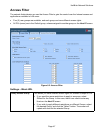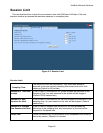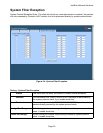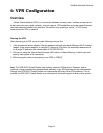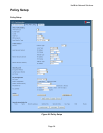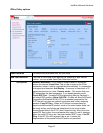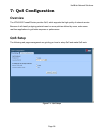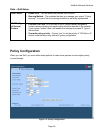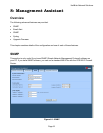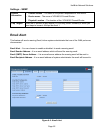
HotBrick Network Solutions
Page 55
VPN Policy Setup
IPSec Traffic Binding
VPN Tunnel List– It shows the tunnels that you have entered. The
router can setup up to 20 tunnels
Tunnel Name– In order to distinguish the tunnel, you have to give
“Tunnel” a name..
Tunnel – Only enable tunnel check box, the tunnel can be connected.
WAN port – You can choose WAN1, WAN2 or Any to make the VPN
connection.
PPPoE Session– If you are using PPPoE to make the connection, and
some ISP offers multiple PPPoE session, you can select these PPPoE
session to construct VPN tunnels.
Local Identity Type – You can either choose your Local WAN IP or
Domain name, Distinguished Name as your local identity.
Traffic Selector
Service– Protocol Type: You can choose either TCP/UDP/ICMP/GRE
protocol as your connection protocol. By default the protocol type is
“Any”.
Local Security Network– These entries identify the private network on
this VPN router, the hosts of which can use the LAN-to-LAN
connection. You can choose a single IP address, the subnet, or a
selected IP range to make VPN LAN-to-LAN connection.
Remote Security Network– These entries identify the private network
on the remote peer VPN router whose hosts can use the LAN-to-LAN
connection. You can choose a single IP address, the subnet, or a
selected IP range to make VPN connection
Remote Security Gateway – You can either select remote side
domain name or remote side IP address (WAN IP address) as your
remote side security gateway.
Security Level
Encryption Method – It specifies the encryption mechanism to use.
Data encryption makes the data unreadable if intercepted. There are
three encryption method available; DES/3DES and AES. The default
is null.
Authentication – It specifies the packets authentication mechanism to
use. Packets authentication proves that data comes from source you
think it comes from. There are three authentications available. MD5,
SHA1 and SHA2.



